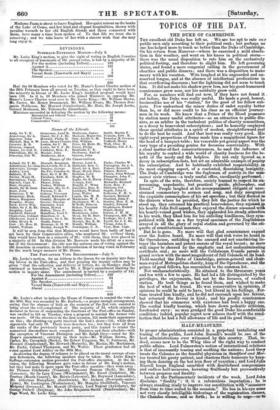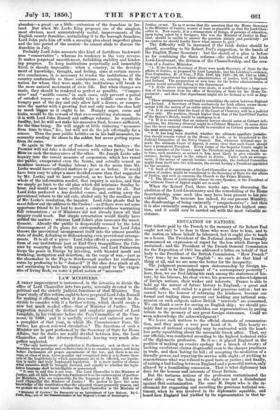HALF-MEASURES.
IF proper administration consisted in a. perpetual tantalizing and teasing of the public, Lord john Russe.Ths-would be one of the best administrations ever witnessed by this country. That, in- deed, seems now to be the Whig idea of the right way to conduct public affairs. Lord Palmerston's notion of international relations is that of incessantly teasing and soothing the nations; Lord Grey treats the Colonies as the fanciful physician in Sandford and Mer- ton treated his gouty patient, and chastens their humours by keep- ing them dancing on the hot iron floor of Vexation; and Lord John Russell keeps England unsettled with doublefaced compromises and endless half-measures, hovering fruitlessly but provocatively between progress and finality.
Look at the Parliamentary incidents of the week. Lord John disclaims " finality " : it is a calumnious imputation ; he is always standing ready to improve our constitution with "measures from time to time suited to the occasion?' He has in his eye some not very clearly intelligible tinkerings of the registration clauses, the Cbandos clause, and so forth ; he is willing to urge or. to abandon—a great—or a little—extension of the franchise in Ire- land. But when Mr. Locke King proposes one of the simplest, most obvious, most unmistakeably useful, improvements of the English county franchise, assimilating it to the borough franchise, Lord John puts him off with a sneering plea about imperfect plans and the late period of the session—he cannot abide to discuss the franchise in July.
Probably Lord John accounts this kind of fastidious backward- ness " conservative ; whereas its tendency is the very reverse. It makes perpetual unsettlement, forbidding stability and hinder- ing progress. To keep institutions perpetually and immutably fixed, is sheerly impossible : when a country, in the develop- ment of knowledge, thought, and feeling, aims at certain succes- sive conclusions, it is necessary to render the institutions of the country conformable to those conclusions ; or, ceasing to fit the nation for whom they were made, the institutions will break in the mere natural movement of civic life. But when changes are made, they should be rendered as perfect as possible. " Compro- mise " and "middle course," in such cases, only prevent a period of satisfied repose; as who should take a middle course in the hungry part of the day and only allow half a dinner' or compro- mise the matter with a growing foot and only make the shoe half as much bigger as it ought to be. Hungry anger, corns and kicks, would be the reward of that over-contriving statesman. So it is with Lord John Russell and suffinge reforms : he repudiates finality, but he will not make his measures final, because sufficient, for the time being. He will niggle at little tinkering "measures from time to time," &o., but will not do the job effectually for a season. Thus the poor publio hobbles on in his half-measures, in- cessantly sending its shoes to the cobler, but never getting repose from its corns.- So again iii 4101 matter of Post-office labour on Sundays: the Premier will not hike a decided 'course with either petty, but in- /ate on each theittinioyances of the other. Mr. Joseph Locke asks inquiry into the recent measure of suspension, which has vexed the public, eitasperated even the Saints, and actually caused an immense increase of Sunday labour; but in the mean time Mr. Locke would have suffered matters te go on as before. It would have been easy to adopt a snore decided course than that suggested by Mr. Locke, and to have resolved, as we have before us the whole of the information needed, that inquiry is useless, and that we simply go back to the old plan which did Minimize Sunday la- bour, and would now have settled the dispute once for all. But Lord John preferred a less decided course, and, cutting away the provisional return to the old rule,' abided only by the needless part of Mr: Locke's resolution, the inquiry: Lord John pleads that he must follow out the address to the Crown !—as if there were not some opportune friend to be had to move a counter-address warranting full retractation ; aa-ifMinisters did not already know all that ingthy could teach. But simple retractation would finally have nettles the matter; ''Whereas Lord John's plan increases the unset- tletneht.'" Alreadrtitf-pUblic is desperately crossed by the total disarrangement of its plans for correspondence ; but Lord John throws the provitionat'nrringenient itself into the 'utmost possible state of doubt, defeating nr'diShearteniag even provisional arrange- ments. It is all of a piece Lord John effects a conservative re- form of of our. itistitatiOns just as 'Earl 'Grey tranquillizes the Colo- niea by wearying them" with exasperation, and Lord Palmerston keeps the peace in Europe by hovering, with blended insult and truckling, instigation mid desertion on the verge Of war,—just as the shoemaker in the Trip to &iiiiorottgh soothe's his customer's corns by professing to be " damned " if the shoe does pinch at all, and continuing to make his vamps without regard to the exigen- cies of living flesh, on aome a priori notion of "measures."



























 Previous page
Previous page